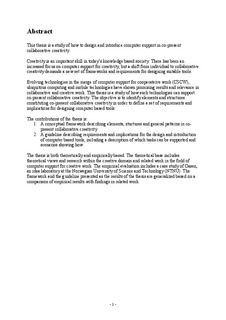Computer Support for Co-present Collaborative Creativity: Framework and guideline for design and introduction of computer support in co-present collaborative creativity
Master thesis
Permanent lenke
http://hdl.handle.net/11250/251024Utgivelsesdato
2005Metadata
Vis full innførselSamlinger
Sammendrag
This thesis is a study of how to design and introduce computer support in co-present collaborative creativity. Creativity is an important skill in today s knowledge based society. There has been an increased focus on computer support for creativity, but a shift from individual to collaborative creativity demands a new set of frameworks and requirements for designing suitable tools. Evolving technologies in the merge of computer support for cooperateive work (CSCW), ubiquitous computing and mobile technologies have shown promising results and relevance in collaborative and creative work. This thesis is a study of how such technologies can support co-present collaborative creativity. The objective is to identify elements and structures constituting co-present collaborative creativity in order to define a set of requirements and implications for designing computer based tools. The contributions of the thesis is: 1. A conceptual framework describing elements, stuctures and general patterns in co-present collaborative creativity 2. A guideline describing requirements and implications for the design and introduction of computer based tools, including a description of which tasks can be supported and scenarios showing how. The thesis is both theoretically and empirically based. The theoretical base includes theoretical views and research within the creative domain and related work in the field of computer support for creative work. The empirical evaluation includes a case study of Oasen, an idea laboratory at the Norwegian University of Science and Technology (NTNU). The framework and the guideline presented as the results of the thesis are generalized based on a comparison of empirical results with findings in related work.
